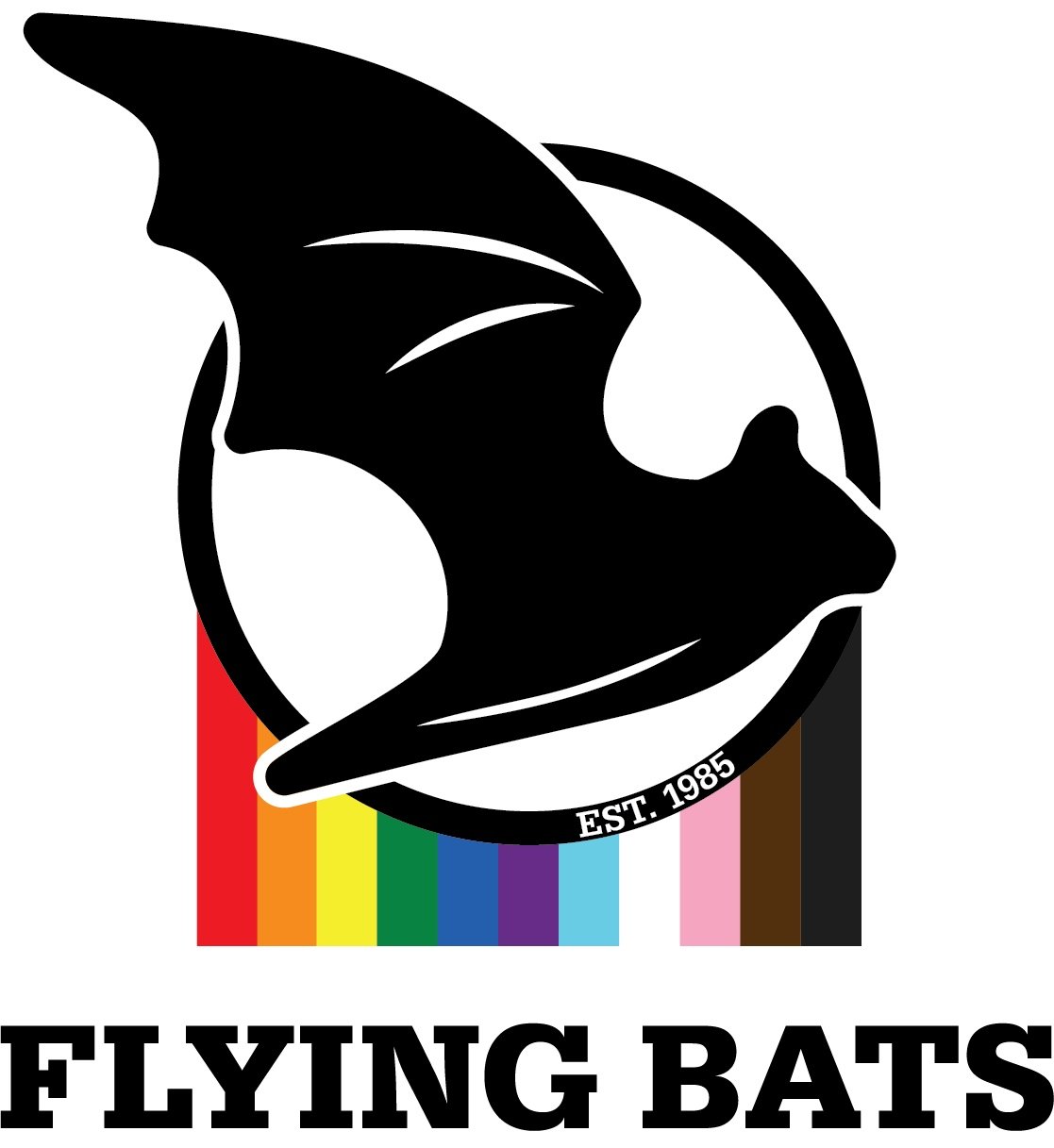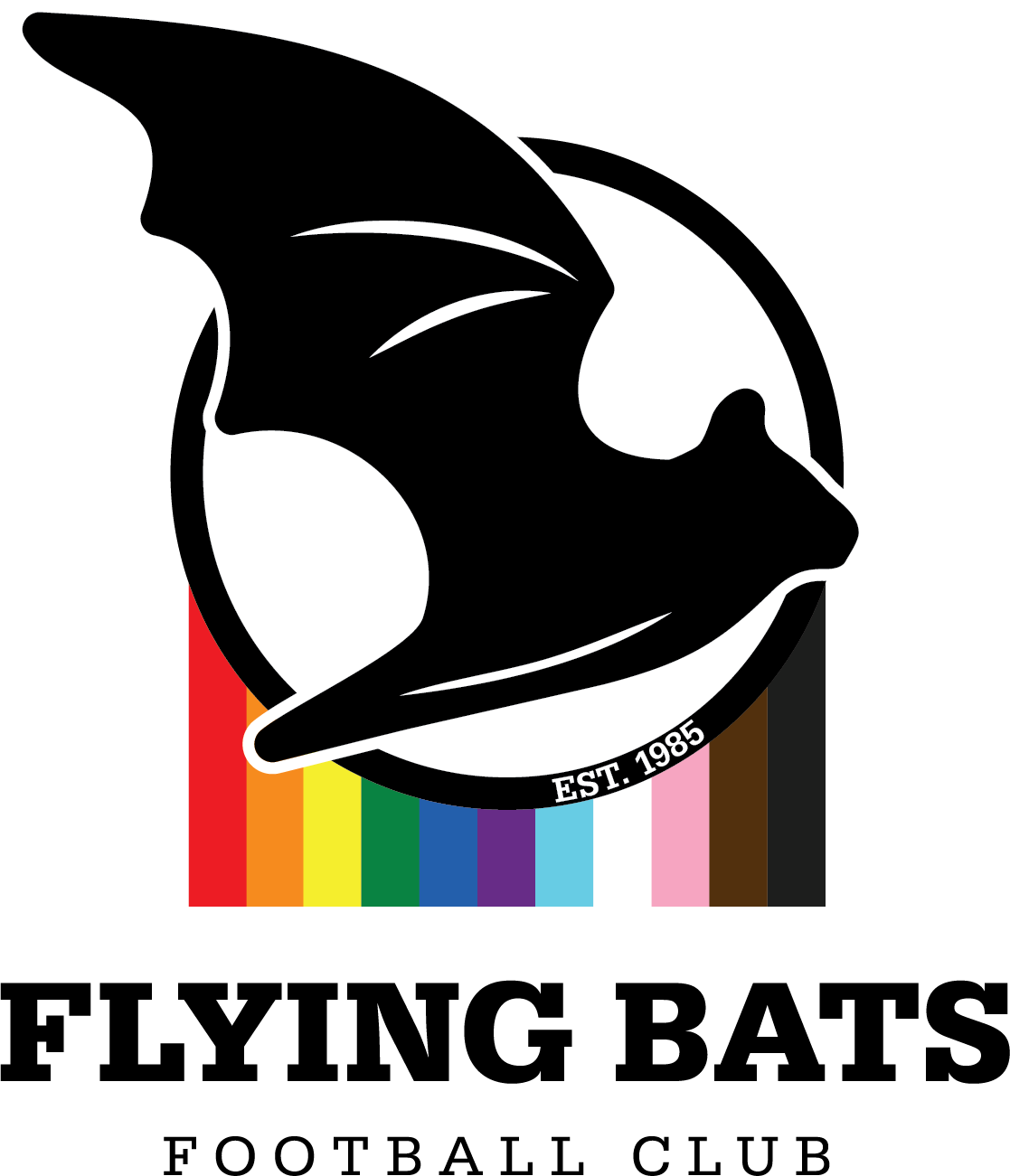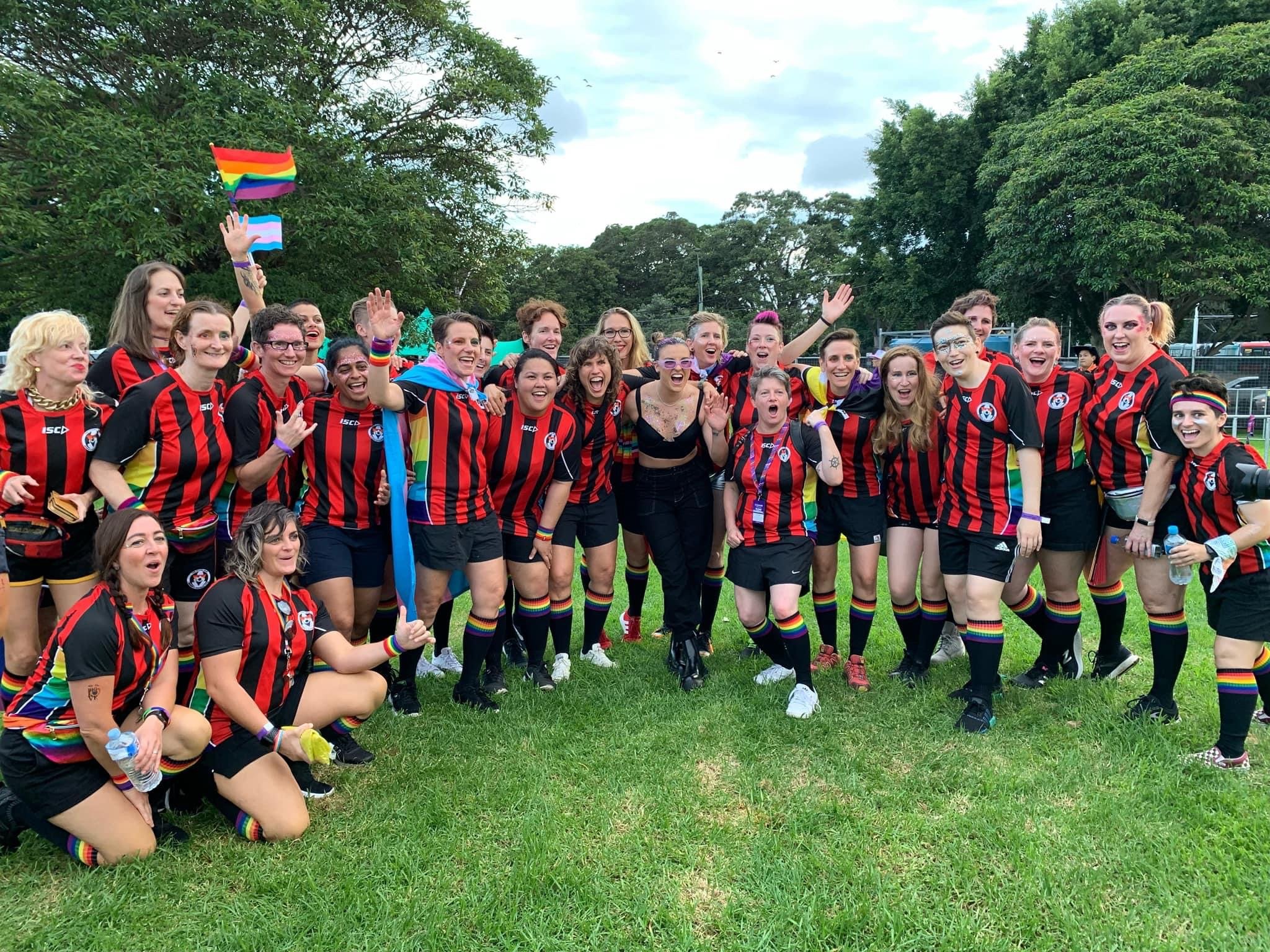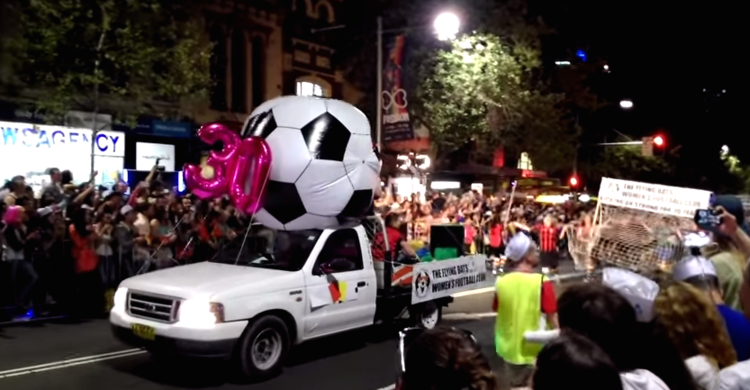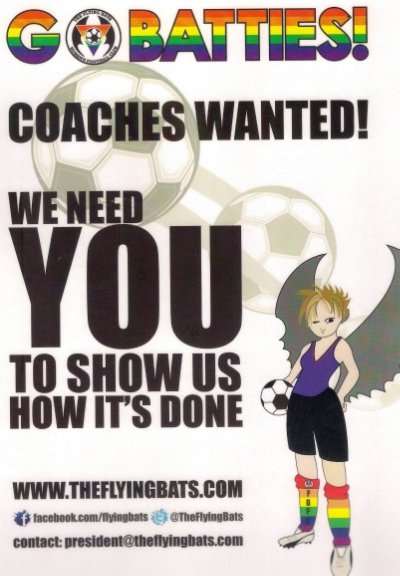Community
Throughout its history, the Flying Bats has provided women, including large numbers of queer women a sense of being part of a vibrant and supportive community.
All Skills are welcome
The Club was created at a time when women’s sports received far less attention than they do today and when lesbians had far less sporting options than gay men. Many of the early players had not played soccer previously but were still encouraged to take to the field.
Tracey Atkinson, an original Flying Bat, stresses the encouraging attitude that early players promoted. She says “We were always positive on our team. No one could do anything wrong. If you were out there and you were kicking…” She continues “That’s what I kind of liked about it was the team spirit; we’re the Bats – when we got our t-shirts on, we were all for one and one for all type thing.”
“...really it didn’t matter if you had any skill at all, or whatever, as long as you wanted to be there, you were welcome..”
Alison Todd (left) and Linda Patterson (right) c. 1986 at a house party
Sue Kerr remembers that “we also tried to let everybody play regardless of their skills ability until we got to the finals. If we got into the finals, then the team was selected much more based on skill. But it was really about whole lots of people [coming] to the Flying Bats to learn how to play footy. A hell of a lot of them didn’t have a clue. Didn’t know how to stop a ball, didn’t know how to pass with the inside of their foot let alone the outside of their foot.”
This welcoming attitude to people with different skill levels continued into the 2000s, with Sabs Cascio laughing as he recounts that "it's more about camaraderie, it's more about bonding over games, over a beer after a game than winning. Because, god, if it was about winning, then I failed."
A Social Club: Friendship and Connection to Community
The social environment of the Flying Bats provided many women with a refuge from broader social prejudice and allowed many to form friendships and a sense of community with other queer women. Original player Alison Todd remembers “it was really nice, nice friendships” that grew from the Flying Bats.
Flying Bats Trashes Fundraise Cricket 2014
Sue Kerr emphasises the important role the Flying Bats played as a social club. “We weren’t there to win football as such. We loved winning, don’t get me wrong. But we were there primarily as a social interaction that wasn’t going out to a pub, that wasn’t going out to a bar which was really the only thing that existed for lesbians at that time. There were very few other ways that you could actually get together socially. So that was what it was formed for really.”
Involvement with the Club introduced early player, Anne Himmelreich, to other lesbians and made her feel connected to a community. She recalls that “on a personal level, it was a really big thing for me. Because it was similar to me coming out at the same time. So it was wonderful to meet other lesbians rather than just the one or two I knew. It was so important for me. It was just – it was just heavenly to meet all these lesbians and think I’m not the only gay in the village. Which was how it felt going through university, my first uni degree. It was wonderful to meet all these women and think, yeah, we’re a community. It’s not just me and a couple of friends. It was so important for me. It was just wonderful. Absolutely wonderful.”
Committee members at the Holy Moley 2021
Other interviewees spoke of a sense of belonging and acceptance within the Flying Bats, as well as the lifelong friendships and relationships that emerged from their time with the Club.
A Resilient Club: Experiences of Homophobia and Marginalisation of Women in Sport
Even from the Club's beginnings, opposing teams and spectators were generally aware that the Flying Bats was predominately a lesbian club. As a result, even though many players were actually seeking a safe and inclusive space to play soccer, Flying Bats members could sometimes be subjected to homophobia. Sue Kerr describes how “there were certain clubs that hated being beaten by lesbians supposedly. So they would take on this whole attitude that would be completely verbal. Mostly it was verbal but there was a whole lot of physical stuff that went on to. Nasty really.” Some contemporary players believe that there is still an element of homophobia that can occur on the field, although this occurs much less than it did previously.
One particular incident dealing with responses to homophobia gave rise to a challenging period for the Club. The incident involved the appearance of a news story in the Sydney Morning Herald sports pages in 1997. In the article, a then player of the Club described examples of discrimination at the hands of referees, opposition coaches and spectators. There were concerns at the time that this 'outing of the Club' could lead to negative consequences for players and the Club, especially given the follow up media interest from TV stations. The article led to serious, but productive discussions with the Gladesville-Hornsby Association and precipitated one of the Clubs most significant achievements - developing a formal and inclusive code of conduct that was adopted by the Association. The Flying Bats navigated this period well and matured as a Club in the process.
Sydney Morning Herald, Thursday 26 June 1997, Page 54
As well as encountering discrimination based on sexuality, the Club also had to grapple with the broader marginalisation and trivialisation of women in sport. Anna Flynn reflects on the marginalisation of women competing in mainstream sporting clubs, and even LGBTIQ sporting clubs: “I think within the gay and lesbian sporting community, the male teams have just been more actively involved.” She points more hopefully that while women “don’t get the coverage that men do” things might change. She believes “on a wider level, ...that women’s football in Australia is really taking off at the moment.”
Sydney's Gay and Lesbian Mardi Gras
The Flying Bats participated in the Mardi Gras parade for the first time in the mid to late 2000s. The first march was under the Flying Bats banner (pictured). In 2007, 'I love soccer' t-shirts, red sequin bat wings and rainbow socks were worn (pictured). The Bats float tradition continues with the Club organising a 'Kicking on strong for 30 years' parade entry in 2015 (pictured).
Mardi Gras has provided the Bats with an opportunity to be visible and engaged directly with other parts of the LGBTIQ community. Contemporary players have pointed to the political meanings that for some are associated with joining the Bats. Jen Peden, who joined the Club around 2007, asserts that Flying Bats means “the active creation and development of community. It provides a positive, safe space for an ever-increasing diversity of the lesbian and wider queer community. It is subversively political even when some of the members don’t realise it. It means enduring visibility.”
“A ready-made community and social life. The shared challenge of working together. It’s a platform to empower and be empowered by a diverse group of LGBTIQ people. Also ... sport feminists!”
Club Bonding
Bonding activities are fondly recalled by many former and current players. Alison Todd, who played in the Flying Bats right from the start, remembers “sometimes we’d have weekends away…we’d all jump in the panel van, we’d go up to the women’s music festival up in Lismore and had mad old times.”
There have been some enduring venues over the years where regular socialising or annual presentation nights took place. Heffron Hall was a hangout in the early days. In the 2000s, socialising moved to the William Wallace pub in Balmain. Today, the Golden Barley in Newtown sponsors the Club and hosts many gatherings. More recently, Palms on Oxford Street has been a regular favourite for Bats bonding nights. With a touch of humour, Anna Flynn asserts that “Palms stays exactly the same. It hasn’t changed one bit. I don’t think the DJ has changed or the bar staff.”
Flying Bats Trivia Night - Michelle MacMahon in 2007 (top) and 2022 (bottom) at the Golden Barley
Events have also been important to increasing the engagement of potential, current and past players with the Club. Sabs Cascio remembers joining after experiencing Bats camaraderie through friends who played. "I went to a Bats trivia at the Golden Barley, this is quite a while ago now. I just liked the group. The people were funny, inclusive and I like the game, so the following season, I joined up."
Flying Bats Picnic at Glebe 2023
Perhaps not surprisingly, given the importance of community to many Bats, there have been many relationships formed within the context of the Club. Anne Himmelreich remembers that “there were lots of relationships starting and finishing and things like that.” Some relationships have been long lasting and there are even babies that have come out of Bats relationships. Tina King-Garde asserts "Another thing I love about the Bats is how it's changed dynamically - children, there are so many children. It's fabulous, I love it - of all types and kinds of situations."
Coaching the Bats: Developing Talent in the Club
There are many Bats who have taken up coaching as a way of giving back to the Club. Georg Hibberd, who coached for around three years in the late 1990s and early 2000s, remembers “I was only a coach because they needed somebody to be honest and because I hadn’t done my ticket or anything. But there were coaches for each team as far as I can remember.”
Flying Bats coaching outreach flyer
For Georg Hibberd, coaching was a rewarding experience, especially when the team she coached in her second year won the final. “Yeah I was pretty pleased with that. They were really happy. It was really good because some of them hadn’t played soccer before and it was just so wonderful to see them really savour it because they honestly didn’t think they could do it, you could tell. When they won it, it was amazing to see. I don’t know if it’s better to coach or play in a grand final sometimes.”
All Ages - Division 6 - training during the winter season 2023
Similarly, Ellen Scott, who plays and coaches, speaks of her happiness at seeing women who had never played before learning skills and enjoying the game. "I was amazed at how quickly they started playing the game and developing and understanding what they were doing. It was quite rewarding to see that. Even more so that they were enjoying it."
Importance of Bats Supporters
Supporters have also done much to promote the culture of the Club. One of the Club's longest participating players, Tina King-Garde, had a husband, Phil, who was a keen supporter of the Flying Bats. The Bats in turn welcomed this support with open arms. Tina recalls "this club embraced him to the point where they bought him his own t-shirt, they bought him his own flags. He took this role very seriously for a couple of years until he couldn't do it anymore."
When Phil passed away, the Club named the Club supporters award after him.
Phil Garde supporting the Flying Bats at a game on 30 April 2006
